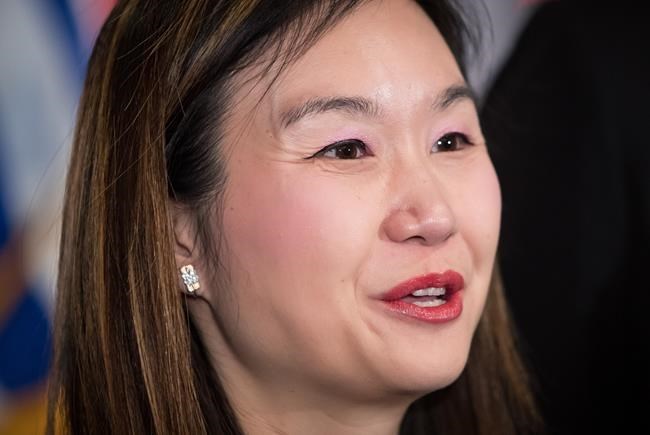
Minister of Citizens' Services, Anne Kang poses for photographs after being named to the position after a provincial government cabinet shuffle, in Vancouver, Wednesday, Jan. 22, 2020. THE CANADIAN PRESS/Darryl Dyck
Republished April 04, 2022 - 4:25 PM
Original Publication Date April 04, 2022 - 1:46 PM
VICTORIA - British Columbia is doubling the number of seats it will subsidize for first-year veterinary college students, a change the voice of the province's veterinarians says is a much-needed step forward to address a "tremendous" shortage of animal doctors.
Corey Van't Haaff, executive director of the Society of B.C. Veterinarians, said animal owners are encountering lengthy wait times for routine and emergency care, which only gets longer the farther away their community is from a city centre.
Ranchers and farmers are finding it difficult to secure visits from veterinarians who don't have time to take on new clients, while rescue groups are struggling to access the care animals needed before they can be put up for adoption, Van't Haaff said.
The society is grateful and "very happy" about the expansion of subsidized seats, she said in an interview.
Anne Kang, the minister of advanced education and skills training, announced Monday that the B.C. government will province $10.68 million to support 40 students entering the Western College of Veterinary Medicine this fall.
Demand for subsidized seats at the college on the University of Saskatchewan campus in Saskatoon has been high and tuition fees have been a barrier for aspiring veterinarians, Kang said.
The cost of tuition for a subsidized seat this fall is about $12,700 annually, she said.
With more graduates in years to come, Kang said people in B.C. can expect shorter wait times for animal care, from family pets to livestock.
Agriculture Minister Lana Popham said extreme weather, including widespread flooding last fall, has been a major challenge for farmers and ensuring B.C. is home to more veterinarians will hopefully help to ease some of their worries.
The expanded funding means B.C. is maximizing the number of seats the province is allowed to subsidize at the veterinary college each year, she added.
The college has about 80 seats and the B.C. veterinary society has been calling on the province to secure access to 20 of the seats that became available when Alberta shifted its funding to the University of Calgary three years ago,Van't Haaff said.
The society has heard from recent B.C. veterinary students who paid international tuition amounting to $69,000 per year to attend the college, she noted.
A 2019 labour survey led by the society found B.C. would need 100 additional veterinarians per year until at least 2024 and Van't Haaff said their group will now consider additional avenues to address the ongoing shortage.
Kang said the government is working on "many" solutions to address the veterinarian shortage.
B.C. is considering ways to improve recognition of foreign credentials and is looking at opportunities for veterinarians who would like to move to B.C., she said.
Dr. Helen Bell of the Pacific Cat Clinic in Victoria told the news conference that it has been difficult for people to access timely care for their animals and veterinarians and their staff have been burning out "under the crushing workload."
She said the expansion is "wonderful news for the profession."
This report by The Canadian Press was first published April 4, 2022.
News from © The Canadian Press, 2022